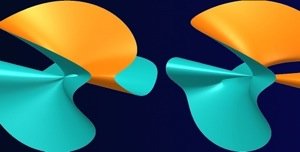Syracuse University conference celebrates internationally renowned mathematician
Conference honors accomplishments of Ragnar-Olaf Buchweitz

Mathematical researchers and graduate students from across the United States and Canada will converge on the Syracuse University campus April 13 to 15 to celebrate internationally renowned mathematical theorist Ragnar-Olaf Buchweitz and to discuss the intersection of two diverse areas of mathematical reasoning—commutative algebra and representation theory. The conference is sponsored by the Department of Mathematics in SU’s College of Arts and Sciences with funding from the National Science Foundation (NSF).
The conference, which is open to anyone with an interest in mathematical theory, will begin at 4:30 p.m. Friday, April 13 and end at noon Sunday, April 15. Registration information is available on the web.
“Buchweitz has built his career on trying to unify the two groups of mathematicians,” says Graham Leuschke, associate professor of mathematics who worked with Buchweitz as a post-doctoral researcher. “Our mathematics department includes faculty members who study in both of these areas.”
Commutative algebra seeks to study geometric objects by attaching algebraic objects (called rings) to the geometric objects, while representation theory studies the rings, Leuschke says. Conference organizers have invited speakers who work in each area and some who have “crossed the border.” Buchweitz, professor of mathematics at the University of Toronto Scarborough (UTSC), will also be at the conference, which is organized in celebration of his 60th birthday.
Buchweitz, former UTSC vice-principal and dean, received a 2010 Humboldt Foundation Research Award, which recognizes outstanding researchers whose fundamental discoveries, new theories, or insights have had a significant impact on their discipline and who are expected to continue producing cutting-edge achievements in the future. The award has enabled Buchweitz to pursue his work in collaboration with mathematicians at Ruhr-University in Bochum, the University of Kaiserslautern in southwestern Germany, and the University of Bielefeld in the northwest part of the country. Buchweitz has written more than 30 research papers. He holds a Ph.D. from Universität Hannover.
In his research on commutative algebra and algebraic geometry, Buchweitz uses tools from homological algebra, which some describe as the most abstract form of pure mathematics. Work Buchweitz accomplished more than 20 years ago in the area of ‘Matrix Factorizations’ has been adopted by theoretical physicists using string theory to describe nature on a tiny scale.
After receiving the Humboldt, Buchweitz was asked to describe his favorite aspect of his work, to which he replied: “To quote a mathematician friend of mine: ‘I like to solve problems no-one else knows the answers to!’ It is incredibly satisfying to lift the veil from the unknown – if only a little bit – and to come up with an answer to age-old problems or riddles. As a youngish mathematician in 1981, I provided a counter-example to something people had believed to be true for more than 100 years. The comment I received from a very famous mathematician at Harvard, where I gave a presentation on this, was ‘Don’t tell me it’s that easy!’ I still regard that as the most profound compliment I ever got.”
Media Contact
Judy Holmes
